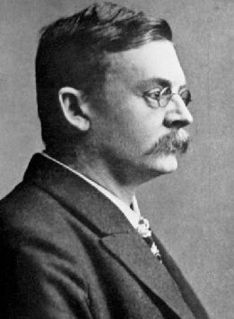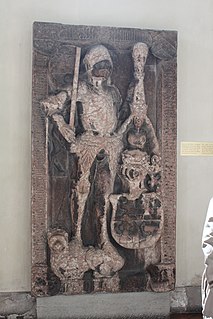Ernst Münch was a German plant physiologist who proposed the Pressure Flow Hypothesis in 1930.

The Rössen culture or Roessen culture is a Central European culture of the middle Neolithic.

Abraham (Adolf) Berliner was a German theologian and historian, born in Obersitzko, in the Grand Duchy of Posen, Prussia. He received his first education under his father, who was teacher in Obersitzko. He continued his education under various rabbis, preparing himself at the same time for the University of Leipzig, where he received the degree of doctor of philosophy.
Heinz Ellenberg was a German biologist, botanist and ecologist. Ellenberg was an advocate of viewing ecological systems through holistic means. He developed 9–point scales for rating European plant preferences for light, temperature, continentality, nutrients, soil moisture, pH, and salinity.

Albert Grünwedel was a German indologist, tibetologist, archaeologist, and explorer of Central Asia. He was one of the first scholars to study the Lepcha language.
Hans-Georg Stephan is a German university professor specializing in European medieval archaeology and post-medieval archaeology.
Paul Heinrich Adalbert Reinecke was a German prehistorian and archaeologist.
Hartmut Boockmann was a German historian, specializing in medieval history.
Hayo Vierck was a German archaeologist, who made a distinguished contribution to German Early Medieval archaeology through research in the industrial arts.

Princely count William III of Henneberg-Schleusingen was a member of the House of Henneberg. He was the son of William II of Henneberg and Catherine of Hanau. William III inherited the princely county of Henneberg in 1440, when his father died in a hunting accident. In 1469, he married Margaret, the daughter of Duke Henry the Peaceful of Brunswick-Lüneburg.
Ivan Strez Balšić and his brothers George Strez and Gojko Balšić were the lords of Misia, a coastal area from the White Drin towards the Adriatic. The brothers were members of the Balšić family, which earlier held Zeta, but had now placed itself among the nobility in Albania. They participated in founding of the League of Lezhë, an alliance led by their maternal uncle Skanderbeg. Ivan and Gojko supported Skanderbeg until he died in 1468 and then continued to fight against Ottomans together with Venetian forces. After Skanderbeg's death Venice installed Ivan Strez Balšić as Skanderbeg's successor.
Barbara Scholkmann was professor of medieval archaeology at the University of Tübingen until her retirement in 2007. From 2001 to 2006 she was vice-chancellor for study and teaching at Tübingen. Scholkmann is a corresponding member of the German Archaeological Institute. She is a former school teacher.
Horst Wolfgang Böhme is a German archaeologist with a focus on Late Antiquity / Early Middle Ages and research into castles.
Heidemarie Koch is a German Iranologist.

The Neckar-Odenwald Limes is a collective term for two, very different early sections of the Upper Germanic-Rhaetian Limes, a Roman defensive frontier line that may have been utilised during slightly different periods in history. The Neckar-Odenwald Limes consists of the northern Odenwald Limes (Odenwaldlimes), a cross-country limes with camps, watchtowers and palisades, which linked the River Main with the Neckar, and the adjoining southern Neckar Limes (Neckarlimes), which in earlier research was seen as a typical 'riverine limes', whereby the river replaced the function of the palisade as an approach obstacle. More recent research has thrown a different light on this way of viewing things that means may have to be relativized in future. The resulting research is ongoing.
Christian Ernst Weiss was a German mineralogist, geologist and palaeontologist. He is not to be confused with the historian Christian Ernst Weiße (1766–1832).
Adolf Wilhelm was an Austrian classical philologist and epigrapher.
Wilhelm Cloetta was a German Romance philologist and medievalist.

Raiko Krauss, born 1973 in Friedrichshain, Berlin is a German archaeologist of prehistory.
Walter Blankenburg was a German Protestant pastor, director of church music and musicologist, who focused in several publications on liturgy, hymnology, and on the sacred music of the early Baroque period, especially by Johann Sebastian Bach.








